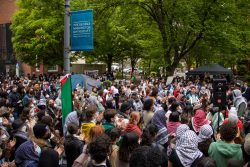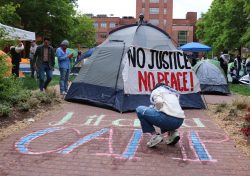Last week, University President John DeGioia responded to a New York Times article that accused Georgetown Law Center of using deceptive tactics to improve its U.S. News and World Report rankings, calling the accusation “nutty.”
The Jan. 8 article reported that Georgetown Law announced to recent graduates three newly-created temporary jobs in the admissions department. The posts would last six weeks and begin days before February 15, the date at which a graduate must be employed to count toward his or her school’s score for the competitive “nine-month employment” category in the U.S. News survey. Georgetown, the article implied, like many other schools, takes advantage of definitions in the surveys, which “seem open to abuse.” It went on to describe University contacts as disorganized and vague in their responses, claiming to have “lost track” of the alumni who took the jobs.
“That I frankly think is kind of a cheap shot,” DeGioia told a Voice reporter in an interview last Thursday. “I think that fundamentally there is a profound issue at stake in the article which didn’t get the kind of sophisticated and appropriate account that it deserves.”
Dr. William Treanor, who joined Georgetown Law as its new dean last August, previously affirmed that one of his primary goals was to help students find work. He outlined his aspirations in an Aug. 19 interview with Georgetown Law magazine.
“A big focus of mine will be doing everything I can to see that students have all the placement opportunities they deserve,” he said. “And that means figuring out where the opportunities are now—small and medium-size firms, public interest positions, regional markets, federal and state clerkships, opportunities in government—and exploring them in ways we may not traditionally have done.”
DeGioia defended the nature of the jobs with which Georgetown Law provided its alumni.
“We’ve hired a number of folks,” he said. “In fact, any student who wanted a position that wasn’t hired, we basically offered a research position at the law school this fall. It doesn’t pay a lot, but it’s employment. It’s very important to retain employment after graduation in the legal market.”
DeGioia also noted that law school applications at Georgetown were up seven percent in recent years in spite of the unnerving statistics. Alumni employment figures were up from their record lows of previous months as well, but administrators and students alike recognize the larger, transformational problem.
“The problem is definitely not limited to [Georgetown] Law,” said an alumnus of the law school familiar with the temporary program, who was not authorized to speak on the record. “It’s also just one symptom of much larger system-wide problems that affect law schools, state bars, [and] law firms.”
School administrators seem to agree. Although DeGioia wrote off the more scathing parts of the article, he acknowledges the challenge Georgetown Law has in store in future years. But he has hope for the future.
“Our law school’s done an extraordinary job at transforming,” he said.




